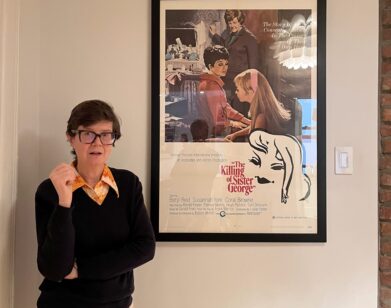Lionel Shriver’s Lost Generation

ABOVE: LIONEL SHRIVER. PHOTO COURTESY OF SARAH LEE.
In Lionel Shriver’s dark satire The Mandibles, A Family 2029-2047 (Harper), there is a wall between the United States and Mexico to keep the Americans out. The U.S. economy has tanked and the dollar is worthless. America’s first Mexican-born president is in power and inflation is rampant. People are being house-jacked at gun point, while the elderly are living past 100.
In the midst of this maelstrom of adversity are four generations of the once well-to-do Mandible family, desperately trying to survive in an overrun Brooklyn house. Despite the intricately described hardships faced by its protagonists, The Mandibles is as funny as it is ambitious.
Born Margaret Ann Shriver in North Carolina, the author legally changed her name to Lionel at age 15 to better reflect her tomboy personality. A U.S. expat herself, Shriver has long lived in the U.K. with her jazz drummer husband, Jeff Williams. Playing it safe has never been Shriver’s style, and she has a knack for being alarmingly prescient. Though The Mandibles is Shriver’s 13th novel, she is perhaps best known for 2005’s We Need To Talk About Kevin, which explored a mass high school shooting through the eyes of the perpatrator’s mother.
JEFF VASISHTA: This novel is very much about the danger of debt, and it reads like you got an economics degree to prepare. Obviously it was written far before this election cycle but fits the republican scare mongering narrative. How did you conjure this up?
LIONEL SHRIVER: As for seeming to have earned an economics degree, you flatter me; my mastery of this material is pretty primitive. Nevertheless, I did a fair amount of homework. After having been bored to death by the business sector my whole life, I was surprised to find books about economics bizarrely gripping—Endgame, Paper Money Collapse, and especially Currency Wars. The field has grown apocalyptic and thus the nonfiction research contributed gracefully to a near-future dystopian novel. Because this is an established genre, I needed to distinguish my book from a host of predecessors. So while I also threw in a kitchen sink of other pet anxieties—fresh water shortage, antibiotic resistant bacteria, etcetera—I concentrated primarily on designing an economic dystopia. It was important to me to put together a future history that would scan, and serve as the backdrop to the domestic story. Economics is really what drives the plot.
That wall—or, in The Mandibles, an electrified, computer-monitored fence—between Mexico and the U.S. is not, as you correctly calculated, a droll allusion to Trump, who had not begun his campaign when I was writing the novel. But I did intentionally contrive Mexico’s erection of that fence as hypocritical. Many, if not most, countries blithely expect their citizens to have carte blanche access to the U.S., “land of immigrants,” as a veritable human right, but put up all manner of barriers to Americans who want to emigrate in the opposite direction. There’s a coastal region of Mexico that has been heavily settled by Americans, especially retirees—forgive me for not having The New York Time‘s article of a few years ago at my disposal, so I can’t cite exactly where—and the resentment of the local population is through the roof. They feel invaded. From the indignant quotes I read, this community exhibits no apparent awareness of the irony that Mexico, with a highly restrictive immigration policy, has sent millions of its citizens to El Norte, and a tiny amount of turn—about might be fair play. So in the novel, when Mexico enjoys an economic boom while the U.S. is in dire fiscal straights, it seemed perfectly credible that Mexico would not roll out the welcome mat for unemployed Americans.
VASISHTA: In addition to the technical gadgets you invent there’s also a language of the future. Where did “roachbar” come from?
SHRIVER: There’s a line planted on the second page, which explains that the market for insect-based protein bars tanked when Hershey’s mass-produced a “notoriously oily product.” Not that it’s especially important for the reader to put it together, but roachbar, meaning rubbish or lousy, would have hailed from that marketing disaster.
I really enjoyed designing my own slang in two tranches, with a second set of expressions for 2047. Cool is careless; a jerk is a boomerpoop. Once the dollar has been inflated to nothing, in mid-century “talking treasury” means bullshitting, and a jerk is a T-Bill. I’m hoping that I don’t over-do the lingo, and that the meaning of these neologisms is clear from context. But I think the little touches of new slang introduce a playfulness to the text. And I was surprised by how hard they were to come up with! It’s astonishing, when you input words you’ve just made up into one of those online urban dictionaries, how many times someone else has already beat you to it.
VASISHTA: One of the most shocking scenes is when Willing mugs a younger boy for food out of desperation. That’s a turning point in the novel. How did you plot the sliding off the edge of a cliff—the gradual sinking into savagery?
SHRIVER: You’re right: that is a very important scene. Though Willing has rationalized quiet thieving, this is the first time he crosses a moral line; hitherto, we’ve considered him morally grounded. His family has absolutely nothing in the house to eat, so Willing threatens a younger boy into handing over a sack of groceries. Mind, he doesn’t hurt the kid—and it’s the very smallness of his transgression that makes that scene work. He is adapting to new circumstances, and you realize that if Willing is now intimidating little boys out of the family groceries, all bets are off: we’re living in a very different moral universe now, a Darwinian one.
The whole key to this novel was controlling the scale. I wanted to document the slide into civic breakdown as gradually and insidiously as possible.
VASISHTA: Luella Mandible adds so much comic relief. She has a unique role. She puts everyone in such abject misery—mainly Carter. I must admit I wanted her to do something crazy when they got house jacked and somehow get rid of Sam and his family.
SHRIVER: In the rare instance that dementia victims make fictional appearances, they are usually benign, heartbreaking, sweet, as perhaps many real dementia victims are. But not all of them. I wanted Carter to get saddled with the kind of la-la senior who would drive you nuts. I like your idea of Luella saving the family from house-jacking, but I had to get the Mandibles out of New York. And sure, each character was broadly contrived to cover a certain general social milieu. For example, Avery stands in for the affluent, who suddenly have nothing; Florence stands in for the skint, who already had nearly nothing, and suddenly have to make do with even less.
VASISHTA: You’ve described Nollie as a merciless parody as yourself. How weird was that writing her?
SHRIVER: Enola Mandible—Nollie for short, which is an anagram of Lionel—was a flagrant authorial indulgence. She’s belligerent, opinionated, and tactless. Her books are titled with the ghastly working titles of my own novels. She buries her food in chili flakes. She exercises like a maniac long past the point that she has any chance of looking more attractive as a consequence. I intended to do a pure piss-take of myself, and also to insert myself as representative of the boomer generation—i.e., a big economic problem. But as the novel advanced, gosh. Despite myself, I kind of grew to like her.
VASISHTA: Dystopian novels are hard to pull off, especially this one because it’s set in the near future and the economic break down is very much related to today. It has to be realistic and a little unrealistic, too. Surely there are easier topics to cover with credibility?
SHRIVER: I was a little nervous about getting the economics wrong, because this isn’t my field. I showed the manuscript to a journalist at the Financial Times to have it checked over for any egregious economics errors, and fortunately he didn’t find any.
VASISHTA: Do you find that you write about America with more poignancy and greater satire because you don’t live in the U.S.?
SHRIVER: I’m not sure my being an expat makes that much difference. I do come back to the U.S. every summer, and without doing so, I can’t imagine how I would know what I was talking about when setting a novel there. Britain may have most influenced my sensibility by pulling my sense of humor in a wicked, bone-dry direction. I do worry that Americans could be less likely to get my jokes—what I find comical, my compatriots may regard as offensive. But I can live with offending people. In fact, it’s become politically important to offend people, because we have to fight back against this notion that being offensive should be against the law or something, and that everyone supposedly deserves “respect” for their often dopy views.
THE MANDIBLES, A FAMILY 2029-2049 IS OUT TODAY.






